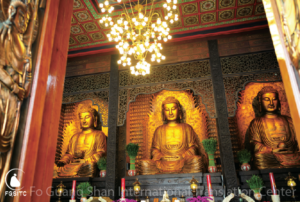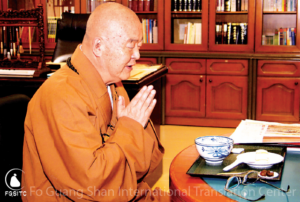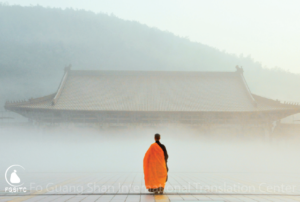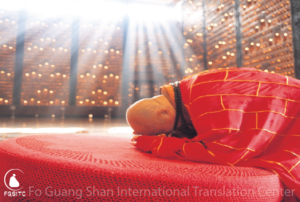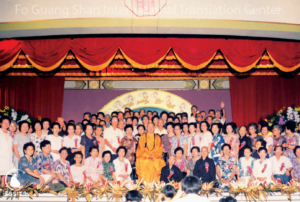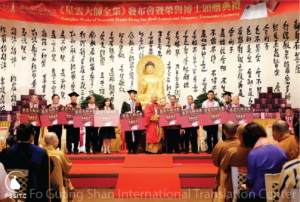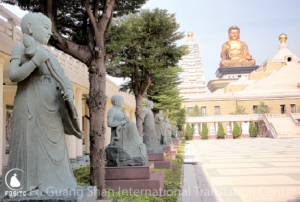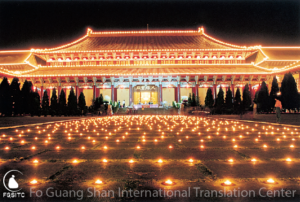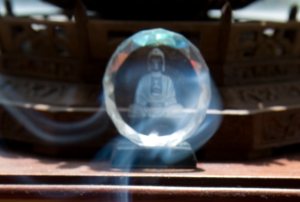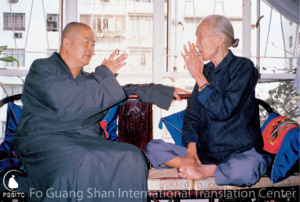Highlights from the book I Am Not a Monk “Sponging Off” Buddhism, by Venerable Master Hsing Yun
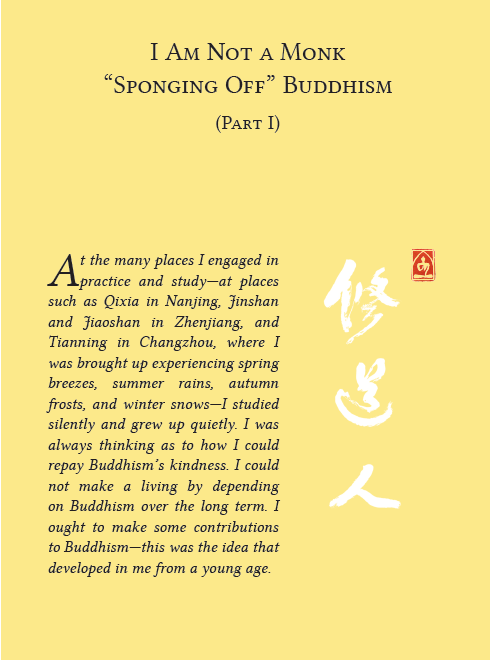
I Am Not a Monk
“Sponging Off” Buddhism
(Part I)
At the many places I engaged in practice and study—at places such as Qixia in Nanjing, Jinshan and Jiaoshan in Zhenjiang, and Tianning in Changzhou, where I was brought up experiencing spring breezes, summer rains, autumn frosts, and winter snows—I studied silently and grew up quietly. I was always thinking as to how I could repay Buddhism’s kindness. I could not make a living by depending on Buddhism over the long term. I ought to make some contributions to Buddhism—this was the idea that developed in me from a young age.
- Repaying Kindness, Dedicating Everything to Buddhism
I promised myself to be someone who repays kindness, and furthermore I vowed “to give to others and not expect others to give to me.”
I only wanted to be the monk who cooks the vegetables and rice, and nothing more. In no way did I ever imagine I would become the “Venerable Master” of whom everybody speaks.
I do not know what reasons took me from the poor and simple job of a vegetable and rice cooking monk so that I could wander here to Taiwan. The kindheartedness of the Taiwanese people and the simple fare of Taiwan nurtured me into maturity. They even showed deference to me with my status as a monastic, and they wanted me to teach the Dharma.
At first I thought, there is a saying: “The Dharma is universal, neither high nor low”; giving teachings on the Dharma and cooking vegetables as an offering to the monastic assembly are the same thing, so there is no point to making distinctions between them.
Thus, I slowly took the route of propagating the Dharma, establishing temples, securing the monastic community, and liberating sentient beings.
But frankly speaking, now that I am ninety years old [2016], were you to ask me if I have any regrets, it would be my inability to become the vegetable and rice cooking monk I initially wanted to be.
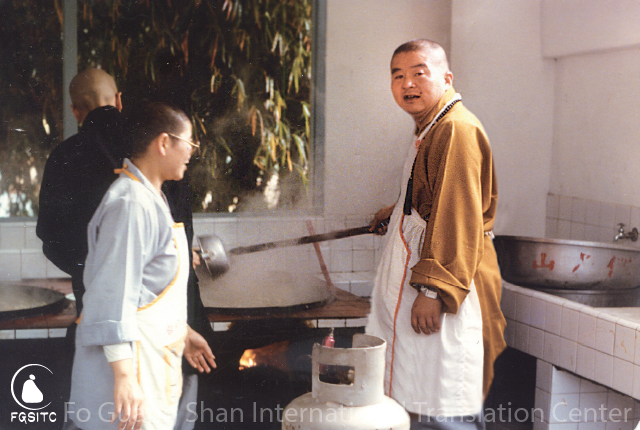
Fo Guang Shan held the Festival of Light and Peace during the Chinese New Year period, exhibiting Buddhist cultural items and various lanterns. About 100,000 devotees came to pay homage to the Buddha. Seeing the great crowd of people coming into Fo Guang Shan, the Venerable Master quickly set about cooking noodles in the kitchen of the Guole Vegetarian Cafeteria at the Non-duality Gate so that devotees could enjoy a great meal.
Photo by Gao Quanfu, Jan. 25, 1982
- Turning a Withdrawal into an Advance: Dharma Waters Flow Steadily across the Five Continents
Eighteen years after the founding of Fo Guang Shan, I invited one thousand three hundred seniors to celebrate their sixtieth birthday together at Fo Guang Shan. It was at this time that I firmly resigned and withdrew from the abbot position of Fo Guang Shan.
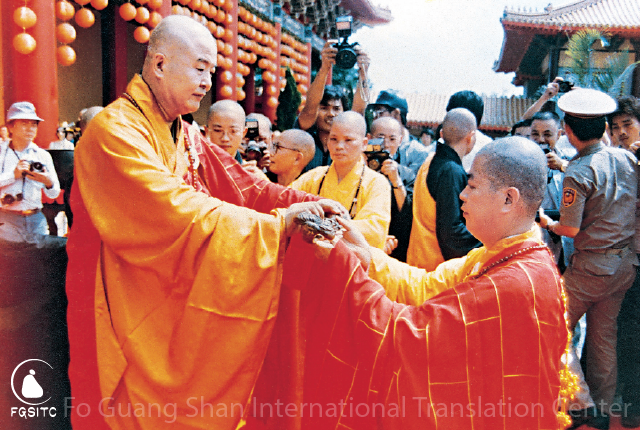
In 1985, the Venerable Master stepped down and Venerable Hsin Ping, who joined the monastic order in 1957, was inaugurated as the second generation abbot of Fo Guang Shan.
In order to dissuade the disciples from developing a habit for dependence, I came up with the idea of traveling the world to propagate the Dharma. The earliest manifestation of this was the establishment of Hsi Lai Temple in the United States, and later there was the establishment of Nan Tien Temple and Chung Tian Temple in Australia. This was followed by the opening of Buddhist centers in such regions as Europe, Africa, and South America.
In this way, all the devotees worked hard together with me in setting up the two hundred to three hundred Buddhist centers around the globe by adapting to the local conditions.
In this human world, I hope that everyone will depend upon me for their meals and livelihood, but I too would be unable to exist without a dependence upon everyone.
In all fairness, when I initially began building Buddhist centers, it was not entirely the result of making the great vow to propagate the Dharma for the benefit of sentient beings either. I only was thinking about how the devotees and disciples had become more numerous: Where would they all go to take their meals? If I were to take some number of devotees to a neighboring Buddhist temple for meals, it would be an embarrassment if we did not make donations to the temple; and it would be an embarrassment even if we did.
In the face of such a dilemma, it would be better to build a temple in places that are often visited. This would allow all the people who came with me to have something to eat.
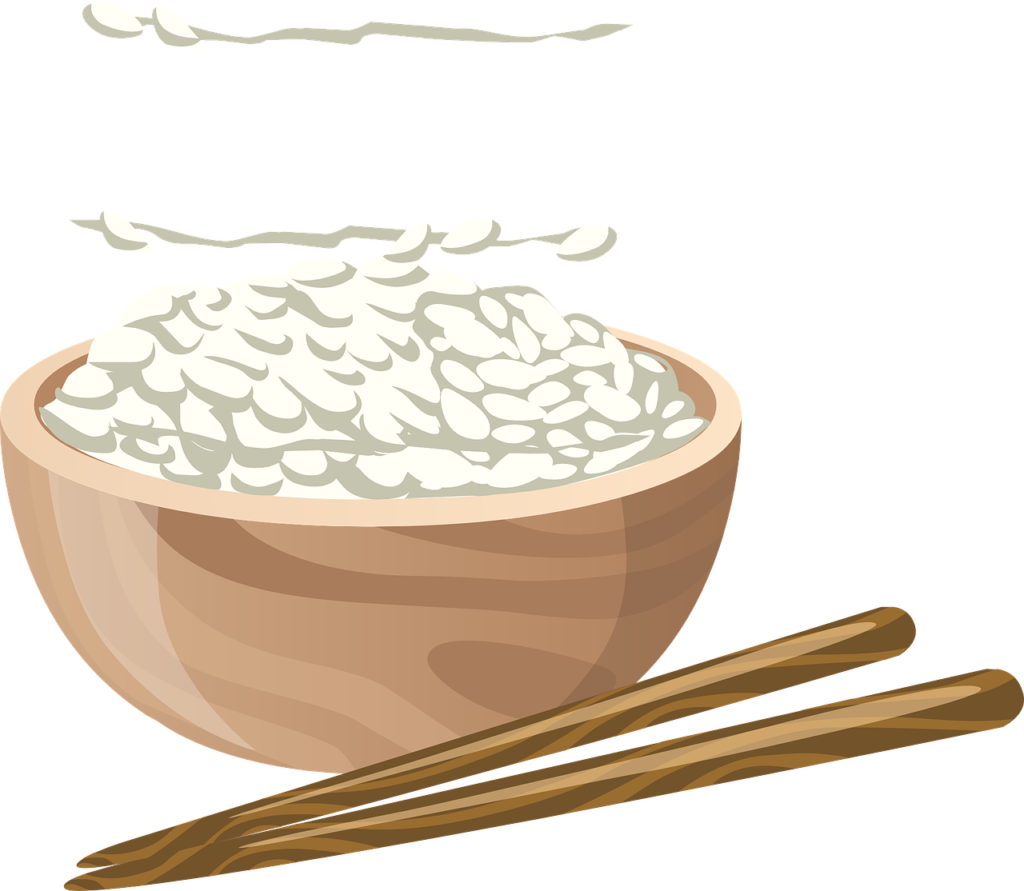
Chapter subheadings:
- Repaying Kindness, Dedicating Everything to Buddhism
- In the Service of Liberating Sentient Beings, Not Becoming a Burned and Ruined Seed
- Human Life Is Precious, It Cannot Be Carelessly Frittered Away
- The Meaning of Life Lies in Contributing to the World
- Turning Nothing into Something: Limitless and Immeasurable Resolve
- Turning a Withdrawal into an Advance: Dharma Waters Flow Steadily across the Five Continents
- Protecting the Dharma and Defending the Faith: Bravely Speaking Out and Making a Stand
- Cherishing the Words of the Teachers Brings a Lifetime of Benefits
- Positive Enthusiasm: Establishing the Four Givings Creed
The Author’s Preface, Forewords, Afterword, and Chinese Editor’s Remarks are available to read online.

